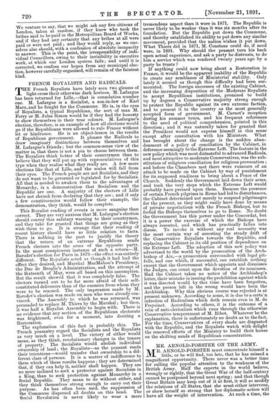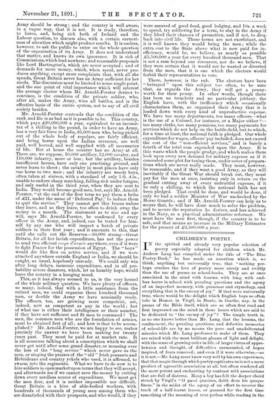MR. ARNOLD-FORSTER ON THE ARMY.
MR. ARNOLD-FORSTER must concentrate himself a little, or be will find, too late, that he has missed a magnificent opportunity. There never was a better time for calling the popular attention to the weakness of the British Army. Half the experts in the world believe, wrongly or rightly, that the Great War of the half-century cannot be postponed beyond next spring ; and that though Great Britain may keep out of it at first, it will so modify the relations of all States, that she must either intervene, or show herself so strong that her diplomatic action will have all the weight of intervention. At such a time, the Army should be strong ; and the country is well aware, in a vague way, that it is not. It is ready, therefore, to listen, and, being sick both of Ireland and the Labour question, to discuss also, with a certain earnest- ness of attention which might produce results. It is useless, however, to ask the public to enter on the whole question of the organisation of its Army. It does not understand that matter, and knows its own ignorance. It is sick of Commissions, which lead nowhere; and reasonable proposals like Lord Hartington's, which are never accepted ; and of demands for more money, which, when spent, never pro- duces anything, except more complaints that, with all she spends, Great Britain never has an Army sufficient for her needs. The discussion must be limited to some single point, and the one point of vital importance which will interest the average elector whom Mr. Arnold-Forster desires to convince, is the condition of the private soldier, who, after all, makes the Army, wins all battles, and is the effective basis of the entire system, not to say of all civil society besides.
Mr. Arnold-Forster contends that the condition of the rank and file is as bad as it is possible to be. This country, which pays £20,000,000 a year, equivalent to an income- tax of a shilling in the pound, in order to have an Army, has a very fair force in India, 65,000 men who, being picked out of the whole body of regulars, are fairly efficient, and being borne upon the Indian revenues, are well paid, well horsed, and well supplied with all necessaries of life. But at home the country has no Army at all. There are, we suppose, 10,000 artillery, 12,000 cavalry, and 110,000 infantry, more or less ; but the artillery, besides insufficient horses, have only one practising ground, and never learn to shoot ; the cavalry in most places have only one horse to two men ; and the infantry are weedy boys, often taken at sixteen, with a standard of only 5 ft. 4 in., unable to endure sharp marching, falling sick under fatigue, and only useful in the third year, when they are sent to India. They would become good men, but, says Mr. Arnold- Forster, " at the end of the first term we pay them a bribe of 421, under the name of Deferred Pay,' to induce them to quit the service." They cannot get this bonus unless they leave, and so they leave, too often to drink away the money in a month. The statement as to size and age will, says Mr. Arnold-Forster, be confirmed by every officer in the Army, and, indeed, can be tested for him- self by any one who will inspect a batch of private soldiers in their first year ; and it amounts to this, that until she calls out the Reserves-50,000 strong—Great Britain, for all her lavish expenditure, has not the power to send two efficient corps d'armee anywhere, even if it were to fight France for the possession of Egypt. The " boys " would die like flies on active service, and if we were attacked anywhere outside England or India, we should be caught, as usual, hopelessly unready. We could only win after long delays, immense expenditure, and in all pro- bability severe disasters, which, let us humbly hope, would leave the country in a hanging mood.
This, as it has always seemed to us, is the very kernel of the whole military question. We have plenty of officers, so many, indeed, that with a little assistance from the retired men, we could organise three hundred thousand men, or double the Army we have nominally ready. The officers, too, are growing more competent, are, indeed, now as competent as any in the world ; but of what use is either their intelligence or their number, if they have not sufficient and fit men to command ? The men, the common men who are the foundation of armies, must be obtained first of all ; and how is that to be accom- plished ? Mr. Arnold-Forster, we are happy to see, makes precisely the answer we have been making for twenty years past. They must be paid for at market rate. It is all nonsense talking about a conscription which we shall never get until after some grand disaster, or moaning over the loss of the " long service" which never gave us the men, or singing the praises of the " old " Irish peasants and Hebrideans and country yokels who used, it is affirmed, to swarm into the regiments. What we have to do now is to hire soldiers in open market upon terms that they will accept, and afterwards see if we cannot save the money by cutting down every needless source of expenditure. We must get the men first, and it is neither impossible nor difficult. Great Britain is a hive of able-bodied workers, with hundreds of thousands of young men among them who are dissatisfied with their prospects, and who would, if they were assured of good food, good lodging, and 10s. a week to spend, try soldiering for a term, to stay in the Army if they liked their chances of promotion, and if not, to drop back into civil life. Those terms are not exorbitant, and it is well known they would bring the men ; while the extra cost to the State above what is now paid for in- efficiency, would be, we believe, as nearly as possible £3,500,000 a year for every hundred thousand men. That is not a sum beyond our resources, nor do we believe, if they were certain that it would not be wasted or diverted from the men, that it is one which the electors would forbid their representatives to vote.
There, however, is the rub. The electors have been " betrayed " upon this subject too often, to be sure that, as regards the Army, they will get a penny- worth for their penny. In other words, though there has been no treachery and no particular jobbery,. the English have, with the inefficiency which occasionally characterises them, so organised their Army that it is loaded down with every kind of unproductive expense. We have too many departments, too many officers—what is the use of a Colonel, for instance, or a Major either ?- too many clerks, too many pensions, too many payments for services which do not help on the battle-field, but to which, for a time at least, the national faith is pledged. Our whole expenditure for wages, officers' pay included, does not exceed the cost of the " non-efficient services," and is barely a fourth of the total sum expended upon the Army. It is this waste which the people grudge, and which makes them look upon every new demand for military expense as if it concealed some plot for taxing them, under cover of prepara- tions which are never really made. They must, however, be reasonable, and if they want a good Army, as they will inevitably if the Great- War should break out, they must pay for the men at once, insisting only in return on the gradual cutting away of every unfruitful expense, if it be only a shilling, to which the national faith has not been pledged. That could be done, and would be done, if only we had a soldier Minister of War unchecked by the Horse Guards ; and if Mr. Arnold-Forster can help us to secure that, he will have done much to solve the problem, and to secure the reputation he desires, and has achieved in the Navy, as a practical administrative reformer. We must have the men first, though, if the country is to be safe, and that means an increase in the Military Estimates for the present of £3,500,000 a year.



















































 Previous page
Previous page